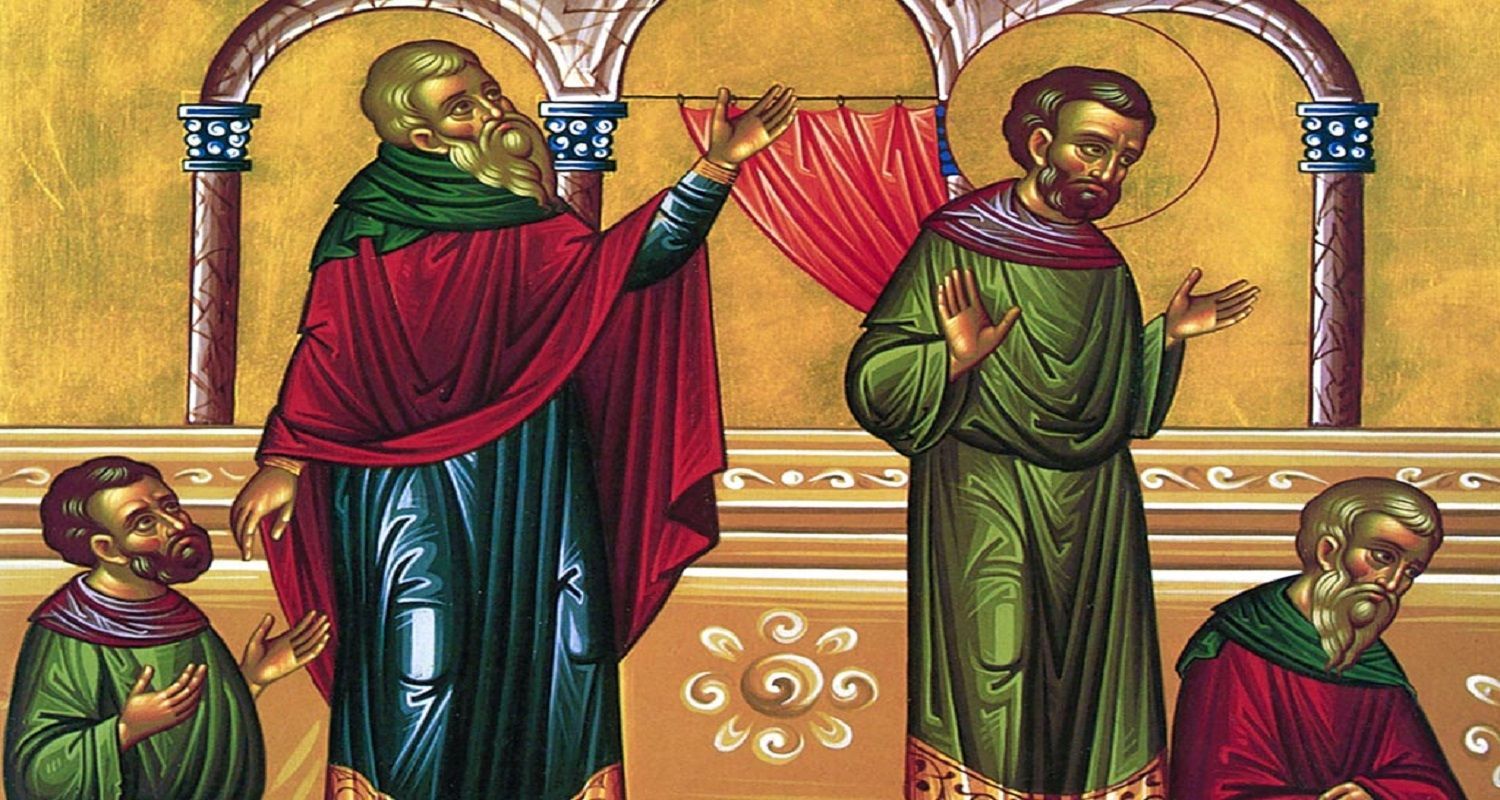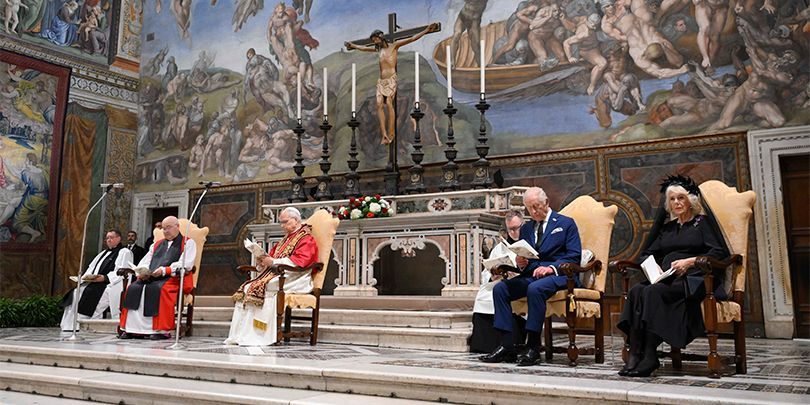Two Men Went to Pray
Honesty and Love Before God:
Pharisee and Tax Collector; Pope and King
- a homily by Abbot Brendan for the 30th Sunday of the Year.
The Pharisee and the Tax Collector
Two men go up to the Temple to pray.
One goes home at rights with God.
The other does not.
To us that sounds familiar, but to Jesus’ first listeners it would have been shocking. The Pharisee — one of the religious elite, a man of prayer, fasting and generosity — does not go away at peace with God. Yet the tax collector — a collaborator, a cheat, the kind of man everyone despised — does.
Jesus is deliberately upsetting expectations. In the world of his hearers, the Pharisee was the good man. But listen to how he prays. His whole prayer circles around himself: “I thank you that I am not like other men… I fast… I pay tithes…” It’s all “I, I, I.”
He is not really speaking to God at all — he’s speaking about himself, to himself. His prayer is a mirror, not a window. He’s Narcissus gazing at his own reflection, preening himself like a cat before the Almighty. He’s forgotten that prayer is meant to be a meeting, not a monologue.
Meanwhile, at the back of the Temple, the tax collector can barely lift his head. He makes no excuses, no comparisons, no claims of virtue. The only movement he makes is to beat his breast. The only words he speaks are: “God, be merciful to me, a sinner.”
That simple prayer — a cry from the heart — becomes the model for all prayer. St Benedict tells his monks that the most perfect prayer is precisely this: the prayer of humility, of the tax collector. The Orthodox monks of the desert built their whole spiritual life around it in the Jesus Prayer: “Lord Jesus Christ, Son of God, have mercy on me, a sinner.”
Two men.
Two prayers.
One filled with himself; one emptied of himself.
Only the empty heart can be filled with God.
1. The First Lesson: Honesty Before God
Prayer, before anything else, is about truth. We can fool others, and often we can fool ourselves — but when we come before God, the masks begin to slip. Sitting in silence before the Blessed Sacrament, kneeling before the Cross, we can’t cling long to our self-importance or to the lies we tell ourselves.
And that’s grace. Because only when we are honest can we grow. Prayer draws us into honesty. It’s not comfortable, but it’s freeing. Perhaps we’ve all had that experience: we enter prayer angry or self-righteous, and somehow we leave quieter, humbler, more ready to forgive.
The Pharisee couldn’t receive that grace, because he never stopped talking long enough to listen. St Benedict says the first step in prayer is to listen. God’s word wants to break into our closed circles of thought — to challenge us, to change us, to make us more real. He puts a word in our ear that jars, that pricks the conscience, that opens us up to the other.
2. The Second Lesson: Prayer Must Lead to Love
The Pharisee says, “Thank God I’m not like other people.” That’s the deadliest prayer of all. His religion makes him proud, separate, self-satisfied. He looks down instead of looking up.
But the closer we draw to God, the more we draw near to others. Anyone who says, “I love God” and despises his brother or sister, has missed the point of the Gospel entirely.
Prayer is never meant to build walls — it is meant to open doors. It should make us gentler, kinder, more forgiving, more human. The word Pharisee means “the separated one.” But the Christian is called to be the reconciled one — the one who, through prayer, grows in communion with others.
The Pope and the King
This week two men went to the Sistine Chapel to pray.
Both were dressed in fine clothes, the outer garments of their office.
But the King and the Pope both know that the heart is what matters.
Anyone who stands before Michelangelo’s magnificent Last Judgement is brought to know those two lessons of prayer — honesty and love.
The King and the Pope, separated by the pain of history,
both know that the only way forward, to be faithful to the Lord’s command,
is to be reconciled — to grow in communion and love.
It was a quiet moment of truth: two men standing before God,
not as monarch or pontiff, but as brothers in faith,
each aware of the wounds of separation, yet open to mercy,
each praying, in the spirit of the tax collector,
“Lord, have mercy on me, a sinner.”
Later, the King would sit on a chair inscribed with the prayer of Jesus,
Ut unum sint — “May they be one” —
as he prayed, surrounded by monks of St Paul Outside the Walls
and our own Br Meinrad and Br Gildas with them.
And perhaps that is where all true prayer must lead us —
beyond titles and appearances, to the humility that allows grace to heal and unite.
For all who humble themselves will be exalted,
and all who open their hearts to mercy will go home justified.
It is true for kings and popes and for us all.











